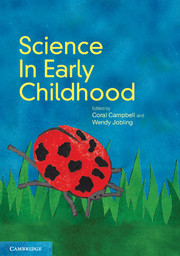Book contents
- Frontmatter
- Contents
- Contributors
- INTRODUCTION
- CHAPTER 1 SCIENCE IN THE NATIONAL EARLY YEARS LEARNING FRAMEWORK
- CHAPTER 2 LEARNING THEORIES RELATED TO EARLY CHILDHOOD SCIENCE EDUCATION
- CHAPTER 3 USING PLAY PEDAGOGY IN THE EARLY YEARS
- CHAPTER 4 TEACHING APPROACHES
- CHAPTER 5 DEVELOPING PEDAGOGICAL PRACTICES FOR SCIENCE TEACHING AND LEARNING WITH 3 AND 4-YEAR-OLD CHILDREN
- CHAPTER 6 EFFECTIVE SCIENCE LEARNING ENVIRONMENTS
- CHAPTER 7 LEARNING SCIENCE IN INFORMAL CONTEXTS: THE HOME AND COMMUNITY
- CHAPTER 8 ENVIRONMENTAL EDUCATION FOR SUSTAINABILITY AND ITS PLACE WITHIN SCIENCE
- CHAPTER 9 CATERING FOR CHILDREN'S DIFFERING NEEDS IN EARLY CHILDHOOD SCIENCE EDUCATION
- CHAPTER 10 PLANNING FOR SCIENCE
- CHAPTER 11 OBSERVING, ASSESSING AND DOCUMENTING LEARNING IN SCIENCE
- CHAPTER 12 PROFESSIONAL LEARNING – REFLECTIVE PRACTICE IN SCIENCE EDUCATION
- Additional resources
- Appendix
- Glossary
- Index
CHAPTER 9 - CATERING FOR CHILDREN'S DIFFERING NEEDS IN EARLY CHILDHOOD SCIENCE EDUCATION
- Frontmatter
- Contents
- Contributors
- INTRODUCTION
- CHAPTER 1 SCIENCE IN THE NATIONAL EARLY YEARS LEARNING FRAMEWORK
- CHAPTER 2 LEARNING THEORIES RELATED TO EARLY CHILDHOOD SCIENCE EDUCATION
- CHAPTER 3 USING PLAY PEDAGOGY IN THE EARLY YEARS
- CHAPTER 4 TEACHING APPROACHES
- CHAPTER 5 DEVELOPING PEDAGOGICAL PRACTICES FOR SCIENCE TEACHING AND LEARNING WITH 3 AND 4-YEAR-OLD CHILDREN
- CHAPTER 6 EFFECTIVE SCIENCE LEARNING ENVIRONMENTS
- CHAPTER 7 LEARNING SCIENCE IN INFORMAL CONTEXTS: THE HOME AND COMMUNITY
- CHAPTER 8 ENVIRONMENTAL EDUCATION FOR SUSTAINABILITY AND ITS PLACE WITHIN SCIENCE
- CHAPTER 9 CATERING FOR CHILDREN'S DIFFERING NEEDS IN EARLY CHILDHOOD SCIENCE EDUCATION
- CHAPTER 10 PLANNING FOR SCIENCE
- CHAPTER 11 OBSERVING, ASSESSING AND DOCUMENTING LEARNING IN SCIENCE
- CHAPTER 12 PROFESSIONAL LEARNING – REFLECTIVE PRACTICE IN SCIENCE EDUCATION
- Additional resources
- Appendix
- Glossary
- Index
Summary
Objectives
At the end of this chapter, you will:
be able to discuss the principles of inclusivity
recognise the diversity of students' needs
describe ways in which educators can be more inclusive in their teaching, specifically in respect of science
demonstrate how the EYLF supports the educator in making decisions relating to inclusive practices in science.
Overview
Our system of education and care is based on the premise that all children have the right to equal opportunities to experience life and learning to the same extent. Yet, the children in early childhood settings arrive with a diverse range of backgrounds and experiences based on social and cultural norms in their lives. How the early childhood practitioner actually puts this into practice in a science context is the focus of this chapter.
Principles of inclusivity
Social justice and equity are important elements of early childhood services in which there is an emphasis on including all students in the everyday life of classroom settings. Accordingly, this emphasis has been instrumental in changing both policy and practice to meet the needs of a diverse range of learners. In particular, people who were often discriminated against and segregated in the past on the grounds of their religion, race, ethnicity, sexuality, disability or gender are a central focus of this educational reform. An outcome of the reform is the focus on inclusive education that is based on the right of all students to access and participate in general education.
- Type
- Chapter
- Information
- Science in Early Childhood , pp. 131 - 147Publisher: Cambridge University PressPrint publication year: 2012



